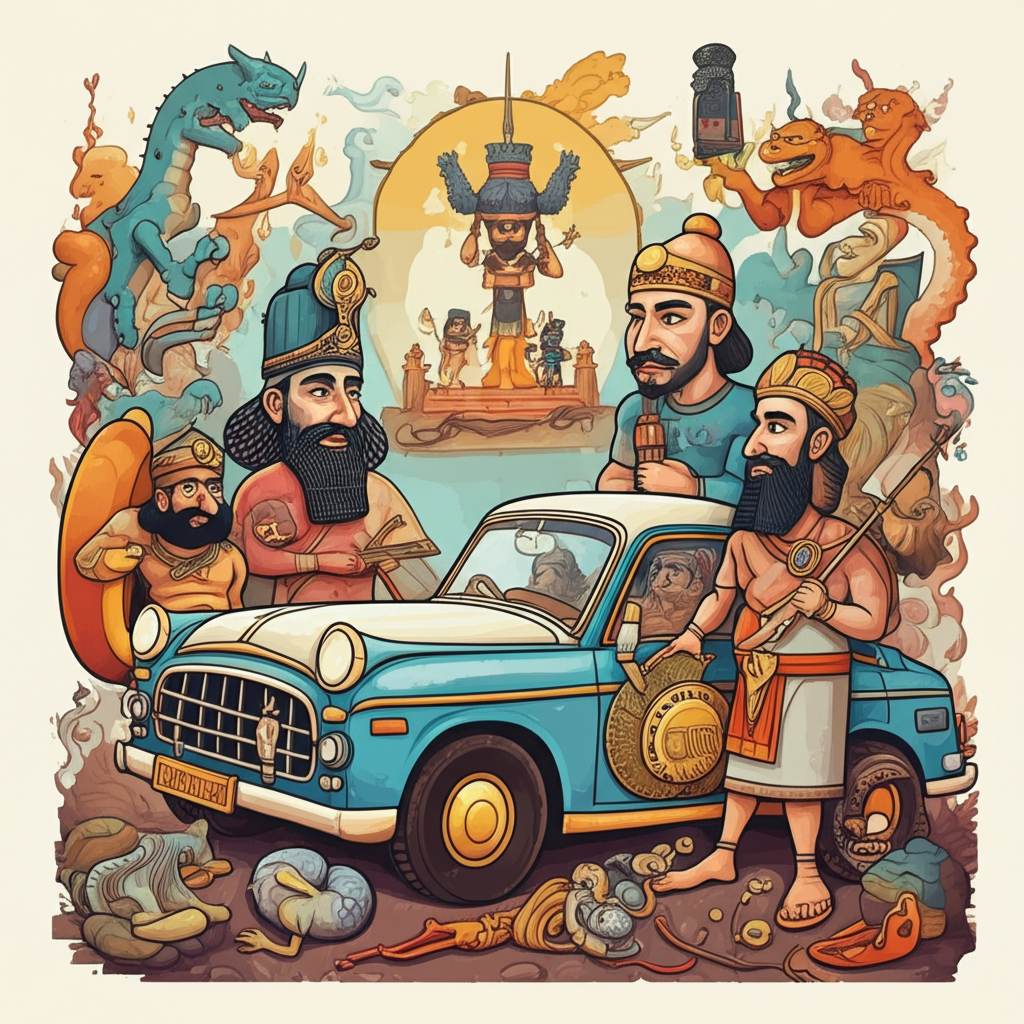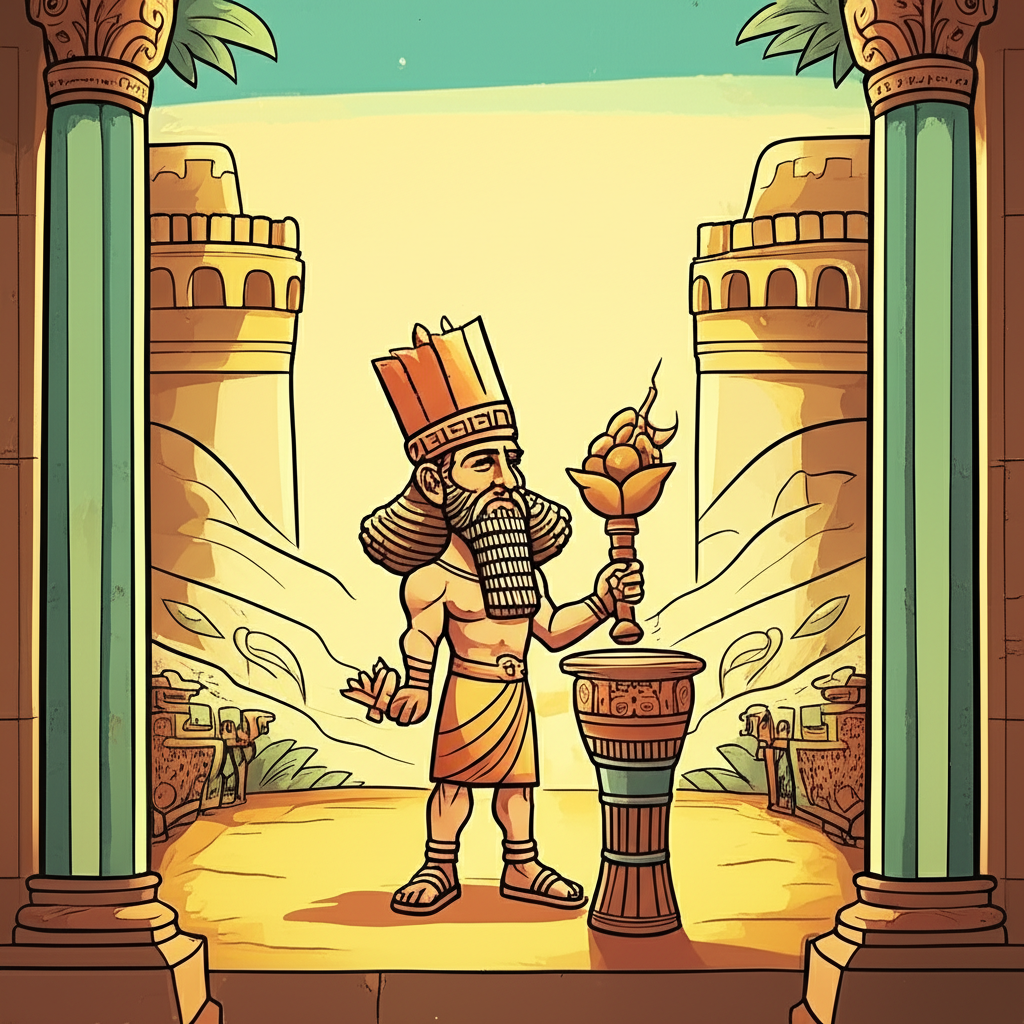
Long before written histories chronicled the rise and fall of empires, ancient peoples sought to understand the fundamental questions of existence: how did the world begin? Who held dominion over the vast cosmos? From the sun-baked plains of Mesopotamia, a civilization that flourished between the Tigris and Euphrates rivers, emerged a grand narrative, a creation epic known as the Enuma Elish. This is not a tale of divine decree in the way modern faiths understand it, but rather a vibrant tapestry woven from the beliefs, anxieties, and aspirations of the ancient Babylonians. It is a story, a cultural artifact, that offers a window into their worldview.
The Enuma Elish, meaning "When on high," hails from the heart of Babylonia, a region that was a cradle of early civilization. The Babylonians lived in a world where nature’s forces – the raging floods of the rivers, the scorching sun, the unpredictable storms – were potent and often terrifying. Their understanding of the cosmos was deeply intertwined with these observable phenomena. They saw the world as a place where order was constantly challenged by chaos, and where the gods, in their often tempestuous interactions, mirrored these earthly struggles. Their society was hierarchical, with a powerful priesthood and a divine-right monarchy. The Enuma Elish, therefore, reflects this societal structure, with a divine king emerging victorious from primordial conflict, bringing order and establishing a cosmic hierarchy.
At the heart of this epic is the titanic struggle between primordial forces, personified by divine beings. The central figure, and ultimately the hero of the narrative, is Marduk. In the Enuma Elish, Marduk is not depicted as a passive creator but as a warrior god, imbued with immense power and wisdom. He is described as possessing unmatched strength, foresight, and the ability to command the very elements. His symbolic attributes lie in his role as the champion who brings order from chaos. He is the embodiment of the Babylonian ideal of a benevolent yet powerful ruler, capable of vanquishing threats and establishing a stable reign. His rise to supremacy is a testament to the Babylonian belief in a divinely appointed leader who can guide their civilization.
The narrative of the Enuma Elish unfolds as a cosmic drama. In the beginning, there was only the primordial abyss, a watery expanse personified by the saltwater goddess Tiamat and the freshwater god Apsu. From their mingling arose the younger gods, a boisterous and restless pantheon. Apsu, disturbed by the clamor of the younger gods, plotted their destruction. However, his plan was revealed to his consort, Tiamat, who, though angered, did not directly intervene. It was the wise god Ea who overheard Apsu’s plot and, using his magic, subdued and killed him.
Tiamat, grief-stricken and enraged by the death of Apsu, vowed vengeance. She gathered monstrous forces, creating fearsome beasts and empowering her new consort, Kingu, to lead them against the younger gods. The pantheon, terrified of Tiamat’s wrath, looked for a champion. Their eyes fell upon Marduk, the god of Babylon, who, after much persuasion and the promise of supreme authority, agreed to face Tiamat.
Marduk prepared for battle, arming himself with powerful incantations and divine weapons. He confronted Tiamat in a cataclysmic clash. With a mighty storm, he unleashed his fury, swallowing her roaring winds and piercing her with his arrow. He then split her colossal body in two, creating the heavens from one half and the earth from the other. From her blood, mingled with Ea’s wisdom, Marduk fashioned humankind, intending for them to bear the burdens of the gods and thus relieve them of their labors.
Following his victory, Marduk established the cosmic order. He set the stars in their courses, decreed the cycles of the moon and sun, and established the boundaries of the heavens and the earth. He was then elevated to the position of king of all the gods, his supremacy cemented by his triumph over chaos. The younger gods, in gratitude and awe, built the magnificent city of Babylon in his honor, making it the spiritual and political center of their world. They then engaged in a great feast, praising Marduk and pledging their obedience, thus affirming the divinely sanctioned order that he had established.
The Enuma Elish, to the ancient Babylonians, was far more than just a story. It was a profound exploration of their understanding of the universe and their place within it. The primordial waters, Tiamat and Apsu, represented the raw, untamed forces of nature that could both sustain and destroy. Their conflict symbolized the struggle between chaos and order, a constant theme in their lives. Marduk’s victory was not merely a personal triumph but the establishment of a cosmic equilibrium, a divine mandate that brought structure and predictability to their world. The creation of humankind from Tiamat’s blood carried potent symbolic weight, suggesting that humanity was intimately connected to the cosmic struggle, perhaps even born from its very essence. The exaltation of Marduk and Babylon mirrored their own societal aspirations, reinforcing the legitimacy of their king and their capital city as the pinnacle of civilization.
In the modern world, the Enuma Elish continues to resonate, albeit in different contexts. It is a cornerstone of Assyriological studies, offering invaluable insights into Mesopotamian religion, cosmology, and literature. Its themes of creation, divine conflict, and the establishment of order have been identified as parallels or precursors to similar narratives in other ancient cultures and later religious traditions. In literature and popular culture, the epic has inspired works of fantasy and science fiction, its cosmic scope and dramatic conflicts providing fertile ground for imaginative storytelling. It serves as a reminder of the enduring human quest to understand our origins and the stories that different cultures have told to make sense of the vast unknown.
As Muslims, we recognize that the Enuma Elish is a traditional story, a testament to the rich tapestry of human imagination and the enduring desire to understand our existence. We acknowledge that only Allah (God) is the true Creator and Sustainer of all that exists, the One without any partners or equals. The Enuma Elish, therefore, is not a belief to be adopted but a cultural artifact to be studied and appreciated for its historical and literary significance. It stands as a powerful example of how ancient peoples grappled with profound questions, weaving narratives that reflected their worldview, their fears, and their hopes. It reminds us of the diverse ways in which humanity has sought to explain the inexplicable, and the enduring power of storytelling to connect us to our past and to the collective heritage of human thought.




